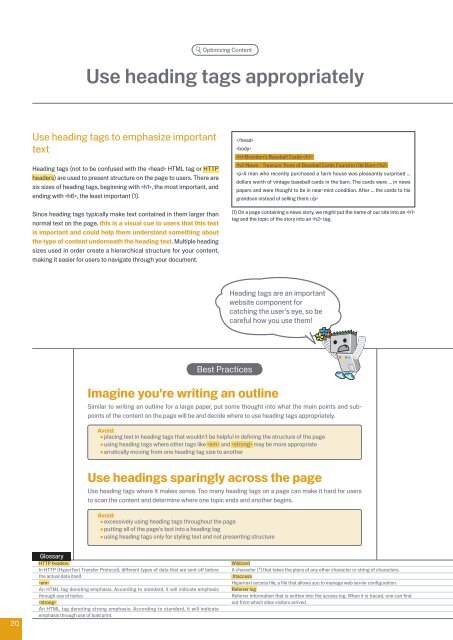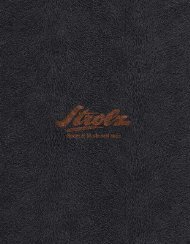Google search engine optimization starter guide
Google search engine optimization starter guide
Google search engine optimization starter guide
You also want an ePaper? Increase the reach of your titles
YUMPU automatically turns print PDFs into web optimized ePapers that Google loves.
0<br />
Optimizing Content<br />
Use heading tags appropriately<br />
Use heading tags to emphasize important<br />
text<br />
Heading tags (not to be confused with the HTML tag or HTTP<br />
headers) are used to present structure on the page to users. There are<br />
six sizes of heading tags, beginning with , the most important, and<br />
ending with , the least important (1).<br />
Since heading tags typically make text contained in them larger than<br />
normal text on the page, this is a visual cue to users that this text<br />
is important and could help them understand something about<br />
the type of content underneath the heading text. Multiple heading<br />
sizes used in order create a hierarchical structure for your content,<br />
making it easier for users to navigate through your document.<br />
<br />
<br />
Best Practices<br />
Brandon's Baseball Cards<br />
News - Treasure Trove of Baseball Cards Found in Old Barn<br />
A man who recently purchased a farm house was pleasantly surprised ...<br />
dollars worth of vintage baseball cards in the barn. The cards were ... in news<br />
papers and were thought to be in near-mint condition. After ... the cards to his<br />
grandson instead of selling them.<br />
Imagine you're writing an outline<br />
Use headings sparingly across the page<br />
(1) On a page containing a news story, we might put the name of our site into an <br />
tag and the topic of the story into an tag.<br />
Similar to writing an outline for a large paper, put some thought into what the main points and subpoints<br />
of the content on the page will be and decide where to use heading tags appropriately.<br />
Avoid:<br />
placing text in heading tags that wouldn't be helpful in defining the structure of the page<br />
using heading tags where other tags like and may be more appropriate<br />
erratically moving from one heading tag size to another<br />
Use heading tags where it makes sense. Too many heading tags on a page can make it hard for users<br />
to scan the content and determine where one topic ends and another begins.<br />
Avoid:<br />
excessively using heading tags throughout the page<br />
putting all of the page's text into a heading tag<br />
using heading tags only for styling text and not presenting structure<br />
Glossary<br />
HTTP headers<br />
In HTTP (HyperText Transfer Protocol), different types of data that are sent off before<br />
the actual data itself.<br />
<br />
An HTML tag denoting emphasis. According to standard, it will indicate emphasis<br />
through use of italics.<br />
<br />
An HTML tag denoting strong emphasis. According to standard, it will indicate<br />
emphasis through use of bold print.<br />
Heading tags are an important<br />
website component for<br />
catching the user's eye, so be<br />
careful how you use them!<br />
Wildcard<br />
A character (*) that takes the place of any other character or string of characters.<br />
.htaccess<br />
Hypertext access file, a file that allows you to manage web server configuration.<br />
Referrer log<br />
Referrer information that is written into the access log. When it is traced, one can find<br />
out from which sites visitors arrived.

















